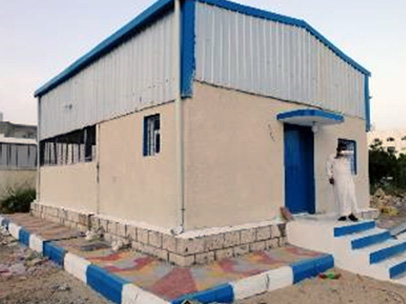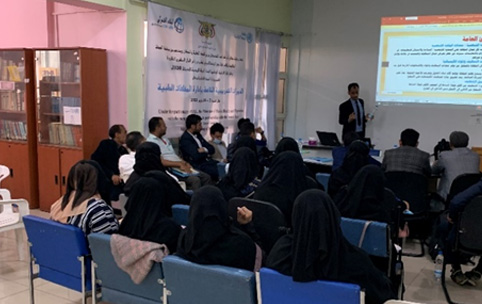 2 January 2025, Aden, Yemen – Safely managing medical waste has been a critical challenge amid Yemen’s ongoing conflict. However, innovative investments and consistent reinforcement of good practices by WHO, the World Bank, and local health authorities are transforming this essential process, protecting communities and the environment.
2 January 2025, Aden, Yemen – Safely managing medical waste has been a critical challenge amid Yemen’s ongoing conflict. However, innovative investments and consistent reinforcement of good practices by WHO, the World Bank, and local health authorities are transforming this essential process, protecting communities and the environment.
Eight years ago, Yemen’s health facilities were engulfed by untreated medical waste, with broken disposal systems threatening public health and safety. In response, WHO and the World Bank embarked on a transformative partnership to overhaul waste management systems across the country.
To address this, WHO designed – in consultation with the World Bank – a low-cost waste treatment unit model, including a plastic shredder and burial pits under units for ashes, sharps and non-sharp waste. WHO then led community consultations and developed environmental and social management plans for each facility where a unit would be installed. After the World Bank cleared the plans, WHO led the contracting and installation, and training to ensure proper use and maintenance of the units.
As of 2024, WHO has installed 60 waste treatment units in Yemen, revolutionizing waste management in 139 of 170 health facilities under the EHCP. Compared to just 20% of facilities with functional systems eight years ago, today, over 81% are equipped to manage waste safely.
Regular monitoring under the EHCP has driven significant improvements. By 2024, compliance with best practices had increased to 91%, thanks to WHO’s proactive measures such as on-site visits, direct communication with facility managers, and collaboration with local authorities.
To promote full compliance, WHO takes constant proactive action. This has included writing to authorities to seek enforcement of good waste management practices on 4 occasions in 2024. Meetings with central and governorate authorities are held at least annually to update and revisit environmental and social standards. In addition, WHO calls between 10 and 25 health facility managers every quarter when issues arise. Whenever security protocols allow, WHO staff from different teams visit facilities to monitor project implementation and follow-up on activities.
 WHO regularly provides critical infection prevention supplies, including personal protective equipment, safety boxes, and segregated garbage bins. These provisions ensure that health workers can implement waste management protocols effectively, safeguarding both patients and staff.
WHO regularly provides critical infection prevention supplies, including personal protective equipment, safety boxes, and segregated garbage bins. These provisions ensure that health workers can implement waste management protocols effectively, safeguarding both patients and staff.
Since 2022, WHO has trained over 8,000 health workers to integrate environmental and social standards (ESS) into their daily routines. One trainee remarked, “This training has empowered us to protect our environment while improving patient care.”
ESS has been integrated in WHO technical programmes in Yemen on quality of care and hospital resilience. Quality teams established in EHCP hospitals include a waste management focal point who monitors the situation regularly. In line with the WHO Hospital Safety Index, disaster management committees in a growing number of facilities assess the situation and seek to remedy any waste management issues, using hospital budgets. This includes, for example, ensuring that sharps safety boxes are available in all departments.
Moving forward, WHO, in collaboration with the World Bank, will intensify its support for health facilities, ensuring compliance with waste management protocols and ESS. This includes expanding monitoring coverage, enhancing local capacity, and fostering partnerships to achieve universal safe waste disposal across Yemen’s health sector.



